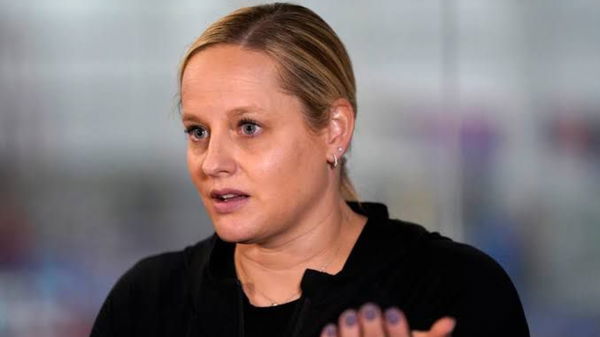

Behind Simone Biles is a powerful coaching duo: Cécile Canqueteau-Landi and her husband, Laurent Landi. Together, this couple has shaped and nurtured gymnastics champions. On April 25, 2024, it was announced that Cecile Landi would be leaving the World Champions Center, owned by Biles’ parents, to become the new co-head coach of the University of Georgia women’s gymnastics team.
As she transitions from coaching elite gymnasts to NCAA athletes, Coach Cecile Landi has already begun to voice her opinions about NCAA judging. Ahead of her new role at the University of Georgia, she has criticized the NCAA judging system, pointing out its flaws and calling for changes to be made.
ADVERTISEMENT
Article continues below this ad
Cécile Landi addresses the changes that need to be made in the NCAA judging system
Cécile Landi, the new co-head coach at the University of Georgia, recently appeared on the ‘All Things Gymnastics Podcast‘ hosted by Ashlee and Brittany Buhler. During the interview, one notable moment arose when the hosts presented fan questions to Cécile about her transition from a WCC coach to the NCAA. One question that perked up the ears of fans was about her thoughts on NCAA judging.
In response, Landi expressed, “I think the 10 that doesn’t have the same value as it had before, it doesn’t mean the same thing. It’s just thrown sometimes when you know as an athlete, I’m sure they know they didn’t; it wasn’t a 10 and it must feel so frustrating ’cause you cannot truly appreciate it.”
She advocated for changes to the scoring system to ensure fairness and to properly reward difficulty and risk-taking. Landi highlighted the inconsistency in scoring across different events, citing examples such as the vault, where gymnasts are pushing boundaries with moves like one-and-a-half twists, deserving of a perfect 10.
Conversely, she observed that on the balance beam, simpler routines often receive perfect scores, which she deemed unfair. She also discussed the floor routine, suggesting that gymnasts should be required to execute difficult elements to start from a perfect 10. Landi compared the current scoring system to the composition rules in Level 10 elite gymnastics, where higher-level skills are required to achieve a perfect score.

She argued that similar standards should be applied at the collegiate level. Landi expressed hope for change, stating, “I think some stuff has to be reviewed and I know they’re having meetings this week and I’m hoping they’re gonna make some changes and good ones.” As we reflect on Landi’s words, it’s important to consider the backlash that NCAA gymnastics scoring has received.
The controversy surrounding NCAA gymnastics scoring
The 2024 NCAA gymnastics season has been marked by controversy surrounding scoring, particularly highlighted by events like the Tennessee Collegiate Classic in January. During this meet, several teams set new program records for the highest team scores, with Wisconsin-Whitewater setting an all-time Division III record.
Despite these exceptional scores, many teams did not come close to reaching similar highs for the rest of the season. The overscoring at the Tennessee Collegiate Classic sparked criticism, with some calling the current scoring system “broken” and “unethical.” Former NCAA judge Rhiannon Franck labeled the judging at the event as unethical, while College Gym News called it a disgrace.
Coaches and analysts like Owen Field, Kathy Johnson Clarke, and Bart Conner have also raised concerns about overscoring. Owen Field highlighted the need for real rule changes, pointing out that 36 out of 87 programs had set scoring records, indicating an alarming trend.
ADVERTISEMENT
Article continues below this ad

ADVERTISEMENT
Article continues below this ad
Johnson Clarke, a former Olympian turned college gymnastics analyst for ESPN, expressed her issue with the rampant scoring inflation and shared, “The rules committee needs to decide what is important in defining the standard of “perfection” for college routines and create a Code of Points w/ an easy-to-apply, mandatory scale of small, but measurably effective deductions to separate superior, great, good & average routines.”
Even Bart Conner echoed similar sentiments, stating that the lack of meaningful separation in scores between good, great, and exquisite performances has become a significant problem. As we reflect on the issues at hand and Cécile Landi’s hopeful message, what are your thoughts on NCAA gymnastics scoring? What changes would you like to see? Comment below!
ADVERTISEMENT
ADVERTISEMENT
ADVERTISEMENT
ADVERTISEMENT

